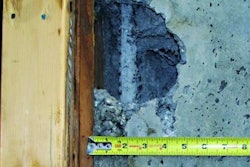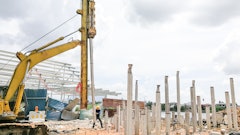The nation’s roads and bridges, nearly half of which are under the financial control of local governments, are in desperate need of federal assistance for long-delayed maintenance and repair work, which would help create jobs in communities across the country, according to a new survey of county engineers by the National Association of Counties (NACo).
NACo, which represents the interests of county governments across the nation, recently commissioned a survey of 1,300 county engineers on America’s road and bridge infrastructure and the economy. In many counties across the country, county engineers oversee roads and bridges on county designated routes.
Major findings of the survey report, “Fixing It: Infrastructure and the Economy,” include the following:
- 81% of responding county engineers report that they have deferred maintenance since the beginning of the economic slowdown;
- 98% report that some of their roads are in poor and/or fair condition;
- 86% report having bridges in poor condition; and
- 91% say that the receipt of infrastructure funding would help create jobs.
Inaction Delays Repairs, Job Creation
The survey findings draw attention to the failure of Congress – under the leadership of both political parties – to pass a multiyear reauthorization of the surface transportation bill, which since 1956 has provided federal funds for road construction and maintenance.
“The nation’s county roads and bridges need work, and the American people need jobs,” said NACo President Lenny Eliason, Commissioner, Athens County, Ohio. “Congress needs to stop playing politics and finding excuses not to reauthorize the federal highway and transit bill as has been done successfully in a bipartisan way for many decades.
“Maintaining safe and reliable transportation infrastructure across America is a basic yet vital function of government,” Eliason said. “It’s long overdue for Washington to reach agreement on a multi-year surface transportation bill.”
The county engineer is often responsible for designing, reviewing and approving plans for new developments, including roadways and bridges, bikeways, sidewalks, and storm water facilities. In addition, county engineers are often responsible for the planning and maintenance of the local transportation network.
The county engineers in the sample group are all members of NACo’s affiliate the National Association of County Engineers (NACE). National Research, LLC conducted the survey by telephone and received 400 completed responses from 31 states, all of which have road and bridge responsibilities.
Other highlights of the survey include the following:
- 11% report that more than $50 million in additional funding would be needed to put all county roads in “good” condition;
- 52% of large urban counties report that more than half of their roads are not in “good” condition;
- 86% of large urban counties report that some of their roads are in poor condition; and
- 51% report that they experienced funding cuts of between 10% to 25% of funding levels since 2008.
Extensions Lead to Tough Choices
In recent years, since the economy has slowed down, counties have been faced with deteriorating road and bridge infrastructure and a loss of jobs in their communities. NACo has witnessed Congress extend the current surface transportation authorization eight times since it expired on September 30, 2009. The current extension expires March 31, 2012.
These extensions allow counties and states to continue working on highway transit projects but hamstring them due to the abbreviated length of the extensions. Typically these extensions have ranged from 16 days to 9 1/2 months and make it difficult for counties to plan and execute infrastructure projects.
At the same time that the Congress has made funding decisions more difficult, states and counties themselves have decreased the availability of funding for infrastructure maintenance. Budget shortfalls at both the state and local level have caused counties to defer badly needed maintenance on transportation infrastructure. As many counties have examined ways to save money and balance budgets, some have furloughed or laid off county employees. During the summer months of 2011, the monthly total of laid off state and local workers exceeded 23,000.
Jobs that could be created by counties in the construction industry are not available because there is no secure funding stream for these infrastructure programs.
Click here to read full survey report.



















